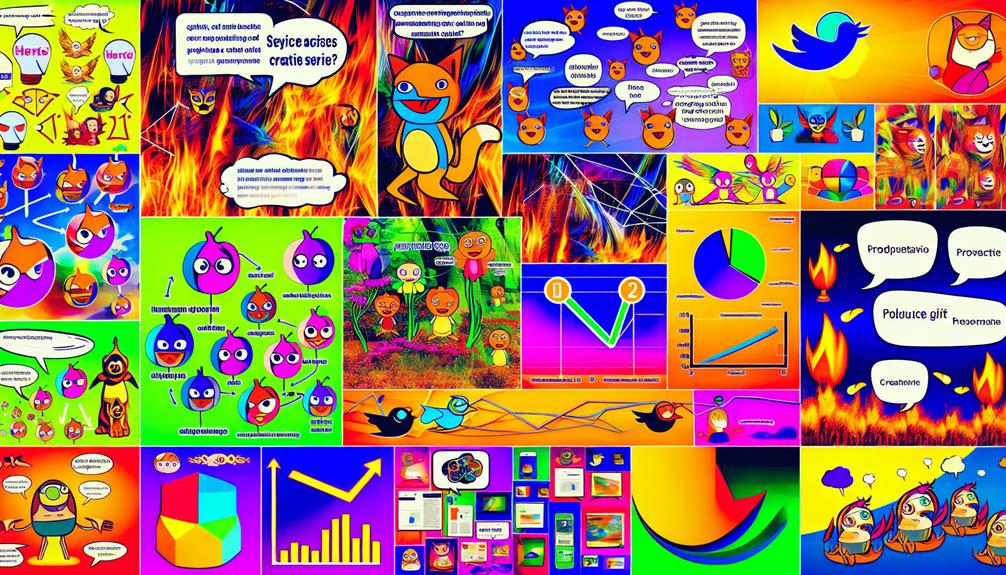The digital marketing landscape in tech is increasingly defined by roles such as SEO Specialists, Content Marketing Managers, and Social Media Strategists. These positions are pivotal for enhancing brand visibility and engaging with target audiences. Email Marketing Coordinators and Digital Advertising Specialists focus on tailored communications and maximizing ROI, while Analytics and Data Specialists transform data into actionable insights. UX/UI Marketing Designers marry creativity with user experience to drive engagement. As the demand for skilled professionals in these areas continues to grow, the implications for future marketing strategies and outcomes are profound, revealing more insights about this evolving field.
Key Takeaways
- SEO Specialists are vital for enhancing online visibility and driving organic traffic through keyword optimization and data analysis.
- Content Marketing Managers craft compelling narratives and strategies that resonate with target audiences, differentiating brands in a competitive market.
- Social Media Strategists engage billions of users by analyzing data to tailor content and foster community through authentic interactions.
- Email Marketing Coordinators build audience loyalty through targeted campaigns and effective audience segmentation, utilizing automation tools for optimal performance.
- Digital Advertising Specialists maximize ROI by crafting compelling ad copy, utilizing A/B testing, and refining strategies based on performance metrics.
SEO Specialist

An SEO Specialist plays a pivotal role in the digital marketing landscape of the tech industry, where visibility can make or break a brand. As the digital marketplace becomes increasingly competitive, understanding emerging SEO trends is essential for businesses seeking to enhance their online presence. These specialists harness data analytics to identify high-performing keywords and optimize content accordingly, ensuring that brands remain relevant and easily discoverable. Additionally, incorporating insights from studies on the health benefits of blueberries can serve as a reminder of the importance of well-researched content that resonates with audiences.
Keyword optimization is more than just inserting popular search terms; it involves a nuanced approach that includes analyzing user intent and behavior. By employing advanced tools and techniques, an SEO Specialist can craft strategies that align with both technical SEO and on-page optimization, ensuring a holistic approach to search engine visibility.
Moreover, staying abreast of algorithm updates and search engine behaviors allows these professionals to pivot their strategies effectively, fostering a sense of belonging and trust among clients and stakeholders. As companies navigate the complexities of digital marketing, the role of the SEO Specialist becomes indispensable, driving organic traffic that translates into growth and sustained success in the tech industry.
Content Marketing Manager
The role of a Content Marketing Manager is integral to complementing the efforts of SEO specialists, as engaging and strategically crafted content forms the backbone of effective digital marketing in the tech sector. This position is pivotal for developing a thorough content strategy that resonates with target audiences, driving both awareness and loyalty. Similar to how Kelly Clarkson's inspiring weight loss journey showcases the importance of commitment and strategy, a successful Content Marketing Manager utilizes data-driven insights to tailor content that not only informs but also captivates.
By analyzing audience behavior and preferences, they create compelling narratives that enhance audience engagement and foster community among tech enthusiasts. This role demands creativity, as the manager must continuously innovate to keep content fresh and relevant in a rapidly evolving landscape.
Additionally, collaboration with cross-functional teams is essential. By aligning with product managers and designers, the Content Marketing Manager guarantees that the content not only attracts but also retains users, ultimately contributing to the brand's overall success. In an increasingly competitive market, the ability to craft a cohesive and effective content strategy is what sets apart leading tech companies, making the Content Marketing Manager a crucial asset in any digital marketing team.
Social Media Strategist

In today's digital landscape, nearly 4.5 billion people engage with social media platforms, making the role of a Social Media Strategist essential for tech companies aiming to establish a strong online presence. This position requires a keen understanding of evolving social trends and the ability to harness them to foster audience engagement. By incorporating insights from various fields, including nutrition and wellness, social media content can be enhanced to engage users on multiple levels, encouraging healthier lifestyle choices through the benefits of low-calorie snacks.
A successful Social Media Strategist meticulously analyzes data to identify target demographics, tailoring content that resonates deeply with specific audiences. By leveraging analytics tools, they assess the performance of various campaigns, ensuring strategies are agile and responsive to real-time feedback. This adaptability is crucial in a world where social media is constantly changing, and what engages audiences today may not work tomorrow.
Additionally, fostering a sense of community is essential. Strategies must encourage authentic interactions, allowing brands to connect on a personal level with their followers. This relational approach cultivates loyalty and enhances brand advocacy, driving both customer retention and acquisition.
As tech companies navigate this competitive landscape, the Social Media Strategist emerges as a pivotal figure, blending creativity with data-driven insights to cultivate brand narratives that resonate and thrive in the digital sphere.
Email Marketing Coordinator
Harnessing the power of targeted communication, the role of an Email Marketing Coordinator has become increasingly essential for tech companies seeking to engage customers directly. This position is pivotal in creating thorough email campaign strategies that resonate with diverse audiences, ultimately fostering a sense of belonging and loyalty among recipients. Just as Sarah Silverman has shared her journey of overcoming mental health challenges, an Email Marketing Coordinator must also navigate the complexities of audience emotions to create impactful messages that connect on a personal level mental health experiences.
An Email Marketing Coordinator must adeptly analyze customer data to segment audiences effectively, ensuring that each communication feels personalized and relevant. By leveraging email automation tools, they can streamline workflow processes, optimizing campaign performance while reducing manual labor. These tools enable the coordinator to schedule campaigns, track engagement metrics, and refine strategies based on real-time analytics.
Moreover, the successful execution of email marketing initiatives hinges on compelling content and design. Coordinators collaborate with creative teams to develop visually appealing emails that not only capture attention but also drive action. As the tech landscape evolves, the ability to adapt and innovate in email marketing will remain critical. In an age where consumers seek connection, the Email Marketing Coordinator stands at the forefront, crafting messages that resonate, build relationships, and ultimately drive conversions, solidifying their role as a cornerstone in the digital marketing landscape.
Digital Advertising Specialist

Digital advertising's dynamic landscape demands a skilled Digital Advertising Specialist who can effectively navigate the complexities of online campaigns. As brands increasingly recognize the importance of a robust digital strategy, these specialists become essential in driving targeted traffic and maximizing ROI. Their role encompasses crafting compelling ad copy, selecting appropriate channels, and utilizing advanced targeting techniques to reach specific audience segments. To excel in this role, specialists can adopt strategies similar to those employed in gaming, such as mastering gameplay, which emphasizes the importance of incremental improvements and strategic decision-making.
A successful Digital Advertising Specialist is adept at campaign optimization, continuously analyzing performance metrics to refine strategies and improve conversion rates. Utilizing tools such as A/B testing and audience segmentation, they derive actionable insights that inform future campaigns. This data-driven approach not only enhances ad effectiveness but also fosters a collaborative environment where creative and analytical minds unite.
Moreover, as the digital landscape evolves, these professionals must stay abreast of emerging trends and technologies, ensuring that their strategies remain relevant and impactful. By fostering a sense of community and collaboration, Digital Advertising Specialists not only contribute to their organization's success but also create a shared sense of purpose among teams. Ultimately, they play a pivotal role in shaping the future of digital marketing within the tech industry.
Analytics and Data Specialist
A proficient Analytics and Data Specialist is essential for transforming raw data into actionable insights that drive strategic decision-making in tech organizations. This role is crucial in harnessing vast amounts of information, enabling companies to navigate the complexities of the digital landscape effectively.
Through the application of advanced data visualization techniques, Analytics Specialists can present intricate datasets in a clear and compelling manner, making it easier for stakeholders to understand trends and patterns. By using predictive analytics tools, they can forecast future outcomes, allowing organizations to anticipate market shifts and customer behaviors. This foresight is invaluable in crafting strategies that resonate with target audiences.
Moreover, the ability to communicate findings in a relatable way fosters a culture of data-driven decision-making within teams, enhancing collaboration and engagement. Analytics and Data Specialists not only provide the numbers but also create narratives that inspire action and drive belonging among team members. As organizations increasingly rely on data to inform their marketing efforts, the demand for skilled professionals in this domain continues to rise, solidifying their role as crucial contributors to the success of tech-driven marketing initiatives.
UX/UI Marketing Designer

The role of a UX/UI Marketing Designer is critical in bridging the gap between user experience and marketing strategies, ensuring that digital products not only attract users but also provide an intuitive interface. This position requires a unique blend of creativity and analytical skills, as designers must understand user behavior through data while crafting visually appealing designs that resonate with target audiences. Essential skills include proficiency in design software, a strong grasp of user-centric design principles, and the ability to collaborate effectively with cross-functional teams to enhance overall brand engagement.
Role Overview and Responsibilities
Creating engaging and intuitive user experiences is at the heart of the UX/UI Marketing Designer's role in tech. This role has evolved considerably, driven by rapid advancements in digital trends and the increasing need for cohesive brand experiences. UX/UI Marketing Designers are responsible for combining marketing strategies with user-centered design principles to create visually compelling and functional interfaces that resonate with users.
Their responsibilities include conducting user research and usability testing to gather insights that inform design decisions. They analyze data to understand user behavior and preferences, guaranteeing that designs not only attract but also retain users. Collaborating closely with product managers, developers, and marketing teams, these designers guarantee alignment between user needs and business objectives.
Additionally, staying abreast of emerging digital trends is vital. This includes understanding the latest design tools, accessibility standards, and responsive design techniques. The UX/UI Marketing Designer must be adaptable, ready to pivot strategies as market dynamics shift, thereby contributing to the overall success of digital marketing initiatives. Their unique blend of analytical thinking and creative design is essential for fostering meaningful connections between brands and their audiences.
Essential Skills Required
Numerous essential skills underpin the effectiveness of a UX/UI Marketing Designer in the tech industry. This role demands a blend of creativity and analytical thinking, enabling professionals to navigate complex digital trends and leverage marketing tools that enhance user experience. The following skills are paramount:
- User Research: Understanding user needs and behaviors through qualitative and quantitative methods.
- Prototyping: Creating wireframes and prototypes to visualize ideas and test design concepts.
- Visual Design: Mastery of design principles, typography, and color theory to create aesthetically pleasing interfaces.
- Data Analysis: Utilizing analytics tools to derive insights and optimize user engagement based on performance metrics.
- Collaboration: Working effectively with cross-functional teams, including developers and marketers, to achieve cohesive project outcomes.
In today's fast-paced digital landscape, UX/UI Marketing Designers must stay attuned to evolving digital trends, ensuring that their designs not only meet aesthetic goals but also enhance functionality. By mastering these skills, professionals can create meaningful connections between users and brands, fostering a sense of belonging and community in an increasingly diversified tech environment.
Frequently Asked Questions
What Qualifications Are Typically Required for These Digital Marketing Roles?
Qualifications for digital marketing roles typically encompass a blend of formal education and practical experience. A strong background in content strategy is vital, as it underpins the creation and management of engaging material. Additionally, proficiency in analytics skills is essential to measure campaign effectiveness and drive data-informed decisions. Candidates who demonstrate creativity alongside these technical competencies are often more competitive, fostering a sense of belonging in the ever-evolving digital marketing landscape.
How Do Companies Measure Success in Digital Marketing Positions?
Companies measure success in digital marketing positions primarily through performance metrics and campaign analytics. Key indicators include conversion rates, return on investment (ROI), and customer engagement levels. By analyzing these data points, organizations gain insights into campaign effectiveness and audience behavior. This analytical approach not only fosters a data-driven decision-making culture but also enhances team collaboration, as professionals can collectively address challenges and celebrate successes, thereby cultivating a sense of belonging within the workplace.
What Industries Are Hiring for These Digital Marketing Roles?
Industries actively hiring for digital marketing roles span across various sectors, particularly technology, e-commerce, healthcare, and finance. As emerging technologies reshape consumer interactions, companies are adapting to job market trends that emphasize digital expertise. Organizations are increasingly seeking professionals skilled in data analytics, social media strategy, and content creation, fostering a dynamic environment where creativity and analytical thinking thrive. This alignment addresses the evolving demands of consumers while ensuring sustained competitive advantage in the marketplace.
Are Remote Work Options Available for These Positions?
Remote work options are increasingly available across various positions, facilitated by the rise of remote collaboration tools and flexible work policies. Organizations recognize the need for adaptability, allowing talent from diverse backgrounds to contribute effectively regardless of location. This shift not only enhances employee satisfaction but also fosters a sense of belonging within teams. Data indicates that such arrangements can lead to increased productivity, as individuals feel empowered to balance work and personal commitments.
What Are the Typical Salary Ranges for These Digital Marketing Roles?
When examining typical salary ranges for digital marketing roles, it's crucial to take into account current salary trends and thorough compensation packages. Entry-level positions may start around $40,000, while mid-level roles can range from $60,000 to $90,000. Senior positions often exceed $100,000, reflecting their strategic importance. These figures can vary greatly based on experience, location, and industry, highlighting the necessity for professionals to stay informed about evolving market dynamics to guarantee competitive compensation.




